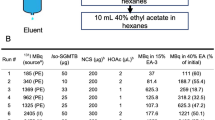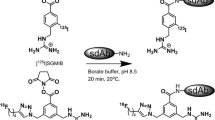Abstract
Purpose
Affibody molecules are a novel class of tumour-targeting proteins, which combine small size (7 kDa) and picomolar affinities. The Affibody molecule ZHER2:342 has been suggested for imaging of HER2 expression in order to select patients for trastuzumab therapy. When optimizing chelators for 99mTc-labelling, we have found that synthetic ZHER2:342 conjugated with mercaptoacetyl-glycyl-glycyl-glycyl (maGGG) and mercaptoacetyl-glycyl-seryl-glycyl (maGSG) chelators provides relatively low renal uptake of radioactivity and could be suitable for therapy.
Methods
maGGG-ZHER2:342 and maGSG-ZHER2:342 were labelled with 186Re and their biodistribution was studied in normal mice. Dosimetric evaluation and tumour targeting to HER2-overexpressed xenografts (SKOV-3) by 186Re-maGSG-ZHER2:342 were studied.
Results
Gluconate-mediated labelling of maGGG-ZHER2:342 and maGSG-ZHER2:342 with 186Re provided a yield of more than 95% within 60 min. The conjugates were stable and demonstrated specific binding to HER2-expressing SKOV-3 cells. Biodistribution in normal mice demonstrated rapid blood clearance, low accumulation of radioactivity in the kidney and other organs, accumulating free perrhenate. Both 186Re-maGGG-ZHER2:342 and 186Re-maGSG-ZHER2:342 demonstrated lower renal uptake than their 99mTc-labelled counterparts. 186Re-maGSG-ZHER2:342 provided the lowest uptake in healthy tissues. Biodistribution of 186Re-maGSG-ZHER2:342 in nude mice bearing SKOV-3 xenografts showed specific targeting of tumours. Tumour uptake 24 h after injection (5.84±0.54%ID/g) exceeded the concentration in blood by more than 500-fold, and uptake in kidneys by about 8-fold. Preliminary dosimetric evaluation showed that dose-to-tumour should exceed dose-to-kidney by approximately 5-fold.
Conclusion
Optimization of chelators improves biodistribution properties of rhenium-labelled small scaffold proteins and enables selection of promising radiotherapeutic agents based on the Affibody molecule.



Similar content being viewed by others
References
Sharkey RM, Goldenberg DM. Perspectives on cancer therapy with radiolabeled monoclonal antibodies. J Nucl Med 2005;46(Suppl 1):115S–27.
Kenanova V, Wu AM. Tailoring antibodies for radionuclide delivery. Expert Opin Drug Deliv 2006;3:53–70.
Goldenberg DM, Chatal JF, Barbet J, Boerman O, Sharkey RM. Cancer imaging and therapy with bispecific antibody pretargeting. Update Cancer Ther 2007;2:19–31.
de Jong M, Breeman WA, Kwekkeboom DJ, Valkema R, Krenning EP. Tumor imaging and therapy using radiolabeled somatostatin analogues. Acc Chem Res 2009;42:873–80.
Nord K, Gunneriusson E, Ringdahl J, Ståhl S, Uhlén M, Nygren PÅ. Binding proteins selected from combinatorial libraries of an alpha-helical bacterial receptor domain. Nat Biotechnol 1997;15:772–7.
Nygren PÅ. Alternative binding proteins: Affibody binding proteins developed from a small three-helix bundle scaffold. FEBS J. 2008;275:2668–76.
Orlova A, Magnusson M, Eriksson TL, Nilsson M, Larsson B, Höidén-Guthenberg I, et al. Tumor imaging using a picomolar affinity HER2 binding affibody molecule. Cancer Res 2006;66:4339–48.
Orlova A, Tolmachev V, Pehrson R, Lindborg M, Tran T, Sandström M, et al. Synthetic affibody molecules: a novel class of affinity ligands for molecular imaging of HER2-expressing malignant tumors. Cancer Res 2007;67:2178–86.
Engfeldt T, Orlova A, Tran T, Bruskin A, Widström C, Karlström AE, et al. Imaging of HER2-expressing tumours using a synthetic Affibody molecule containing the 99mTc-chelating mercaptoacetyl-glycyl-glycyl-glycyl (MAG3) sequence. Eur J Nucl Med Mol Imaging 2007;34:722–33.
Tran T, Engfeldt T, Orlova A, Widström C, Bruskin A, Tolmachev V, et al. In vivo evaluation of cysteine-based chelators for attachment of 99mTc to tumor-targeting Affibody molecules. Bioconjug Chem 2007;18:549–58.
Orlova A, Feldwisch J, Abrahmsén L, Tolmachev V. Update: affibody molecules for molecular imaging and therapy for cancer. Cancer Biother Radiopharm 2007;22:573–84.
Engfeldt T, Renberg B, Brumer H, Nygren PÅ, Karlström AE. Chemical synthesis of triple-labelled three-helix bundle binding proteins for specific fluorescent detection of unlabelled protein. Chembiochem 2005;6:1043–50.
Engfeldt T, Tran T, Orlova A, Widström C, Feldwisch J, Abrahmsen L, et al. 99mTc-chelator engineering to improve tumour targeting properties of a HER2-specific Affibody molecule. Eur J Nucl Med Mol Imaging 2007;34:1843–53.
Ekblad T, Tran T, Orlova A, Widström C, Feldwisch J, Abrahmsen L, et al. Development and preclinical characterisation of 99mTc-labelled Affibody molecules with reduced renal uptake. Eur J Nucl Med Mol Imaging 2008;34:1843–53.
Tran T, Engfeldt T, Orlova A, Widström C, Bruskin A, Tolmachev V, et al. 99mTc-maEEE-ZHER2:342, an Affibody molecule-based tracer for the detection of HER2 expression in malignant tumors. Bioconjug Chem 2008;18:1956–64.
Fortin MA, Orlova A, Malmström PU, Tolmachev V. Labelling chemistry and characterization of [90Y/177Lu]-DOTA-ZHER2:342–3 Affibody molecule, a candidate agent for locoregional treatment of urinary bladder carcinoma. Int J Mol Med 2007;19:285–91.
Orlova A, Rosik D, Sandstrom M, Lundqvist H, Einarsson L, Tolmachev V. Evaluation of [111/114mIn]CHX-A''-DTPA-ZHER2:342, an Affibody ligand conjugate for targeting of HER2-expressing malignant tumors. Q J Nucl Med Mol Imaging 2007;51:314–23.
Tolmachev V, Orlova A, Pehrsson R, Andersson K, Sandström M, Rosik D, et al. Radionuclide therapy of HER2-positive micro-xenografts using a 177Lu-labeled HER2-specific Affibody molecule. Cancer Res 2007;67:2773–82.
Wållberg H, Orlova A. Slow internalisation of anti-HER2 Affibody monomer: implications for development of labeled tracers. Cancer Biother Radiopharm 2008;23:435–42.
Ahlgren S, Orlova A, Rosik D, Sandström M, Sjöberg A, Baastrup B, et al. Evaluation of maleimide derivative of DOTA for site-specific labeling of recombinant Affibody molecules. Bioconjug Chem 2008;19:235–43.
Tolmachev V, Xu H, Wållberg H, Ahlgren S, Hjertman M, Sjöberg A, et al. Evaluation of a maleimido derivative of CHX-A'' DTPA for site-specific labeling of affibody molecules. Bioconjug Chem 2008;19:1579–87.
Persson M, Tolmachev V, Andersson K, Gedda L, Sandström M, Carlsson J. [(177)Lu]pertuzumab: experimental studies on targeting of HER-2 positive tumour cells. Eur J Nucl Med Mol Imaging 2005;32:1457–62.
Liu G, Hnatowich DJ. Labeling biomolecules with radiorhenium: a review of the bifunctional chelators. Anticancer Agents Med Chem 2007;7:367–77.
Visser GW, Gerretsen M, Herscheid JD, Snow GB, van Dongen G. Labeling of monoclonal antibodies with rhenium-186 using the MAG3 chelate for radioimmunotherapy of cancer: a technical protocol. J Nucl Med 1993;34:1953–63.
Kinuya S, Yokoyama K, Kobayashi K, Motoishi S, Onoma K, Watanabe N, et al. Experimental radioimmunotherapy with 186Re-MAG3-A7 anti-colorectal cancer monoclonal antibody: comparison with 131I-counterpart. Ann Nucl Med 2001;15:199–202.
Koppe MJ, Bleichrodt RP, Soede AC, Verhofstad AA, Goldenberg DM, Oyen WJ, et al. Biodistribution and therapeutic efficacy of 125/131I-, 186Re-, 88/90Y-, or 177Lu-labeled monoclonal antibody MN-14 to carcinoembryonic antigen in mice with small peritoneal metastases of colorectal origin. J Nucl Med 2004;45:1224–32.
Moustapha ME, Ehrhardt GJ, Smith CJ, Szajek LP, Eckelman WC, Jurisson SS. Preparation of cyclotron-produced 186Re and comparison with reactor-produced 186Re and generator-produced 188Re for the labeling of bombesin. Nucl Med Biol 2006;33:81–9.
Cyr JE, Pearson DA, Wilson DM, Nelson CA, Guaraldi M, Azure MT, et al. Somatostatin receptor-binding peptides suitable for tumor radiotherapy with Re-188 or Re-186. Chemistry and initial biological studies. J Med Chem 2007;50:1354–64.
Arora P, Oas TG, Myers JK. Fast and faster: a designed variant of the B-domain of protein A folds in 3 microsec. Protein Sci 2004;13:847–53.
Liu CB, Liu GZ, Liu N, Zhang YM, He J, Rusckowski M, et al. Radiolabeling morpholinos with 90Y, 111In, 188Re and 99mTc. Nucl Med Biol 2003;30:207–14.
Qu T, Wang Y, Zhu Z, Rusckowski M, Hnatowich DJ. Different chelators and different peptides together influence the in vitro and mouse in vivo properties of 99mTc. Nucl Med Commun 2001;22:203–15.
Lei K, Rusckowski M, Chang F, Qu T, Mardirossian G, Hnatowich DJ. Technetium-99m antibodies labeled with MAG3 and SHNH: an in vitro and animal in vivo comparison. Nucl Med Biol 1996;23:917–22.
Hnatowich DJ, Chang F, Qu T, Rusckowski M. Technetium-99m labeled peptides – an investigation of multiple HPLC peaks. Appl Radiat Isot 1999;50:911–21.
Rusckowski M, Qu T, Gupta S, Ley A, Hnatowich DJ. A comparison in monkeys of (99m)Tc labeled to a peptide by 4 methods. J Nucl Med 2001;42:1870–7.
Brouwers AH, van Eerd JE, Frielink C, Oosterwijk E, Oyen WJ, Corstens FH, et al. Optimization of radioimmunotherapy of renal cell carcinoma: labeling of monoclonal antibody cG250 with 131I, 90Y, 177Lu, or 186Re. J Nucl Med 2004;45:327–37.
Steffens MG, Kranenborg MH, Boerman OC, Zegwaart-Hagemeier NE, Debruyne FM, Corstens FH, et al. Tumor retention of 186Re-MAG3, 111In-DTPA and 125I labeled monoclonal antibody G250 in nude mice with renal cell carcinoma xenografts. Cancer Biother Radiopharm 1998;13:133–9.
Meijs WE, Haisma HJ, Klok RP, van Gog FB, Kievit E, Pinedo HM, et al. Zirconium-labeled monoclonal antibodies and their distribution in tumor-bearing nude mice. J Nucl Med 1997;38:112–8.
Tolmachev V, Nilsson FY, Widström C, Andersson K, Rosik D, Gedda L, et al. 111In-benzyl-DTPA-ZHER2:342, an affibody-based conjugate for in vivo imaging of HER2 expression in malignant tumors. J Nucl Med 2006;47:846–53.
Goldenberg DM. Targeted therapy of cancer with radiolabeled antibodies. J Nucl Med 2002;43:693–713.
Valkema R, Pauwels SA, Kvols LK, Kwekkeboom DJ, Jamar F, de Jong M, et al. Long-term follow-up of renal function after peptide receptor radiation therapy with 90Y-DOTA0, Tyr3-octreotide and 177Lu-DOTA0, Tyr3-octreotate. J Nucl Med 2005;46(Suppl 1):83S–91.
Nahta R, Esteva FJ. Trastuzumab: triumphs and tribulations. Oncogene 2007;26:3637–43.
Lu Y, Zi X, Zhao Y, Mascarenhas D, Pollak M. Insulin-like growth factor-I receptor signaling and resistance to trastuzumab (Herceptin). J Natl Cancer Inst 2001;93:1852–7.
Bender LM, Nahta R. Her2 cross talk and therapeutic resistance in breast cancer. Front Biosci 2008;13:3906–12.
Friedman M, Orlova A, Johansson E, Eriksson T, Höidén-Guthenberg I, Tolmachev V, et al. Directed evolution to low nanomolar affinity of an epidermal growth factor receptor 1-binding Affibody molecule. J Mol Biol 2008;376:1388–402.
Acknowledgments
This study was supported by grants from the Swedish Cancer Society (Cancerfonden) and the Swedish Research Council (Vetenskapsrådet).
Author information
Authors and Affiliations
Corresponding author
Rights and permissions
About this article
Cite this article
Orlova, A., Tran, T.A., Ekblad, T. et al. 186Re-maSGS-ZHER2:342, a potential Affibody conjugate for systemic therapy of HER2-expressing tumours. Eur J Nucl Med Mol Imaging 37, 260–269 (2010). https://doi.org/10.1007/s00259-009-1268-9
Received:
Accepted:
Published:
Issue Date:
DOI: https://doi.org/10.1007/s00259-009-1268-9




